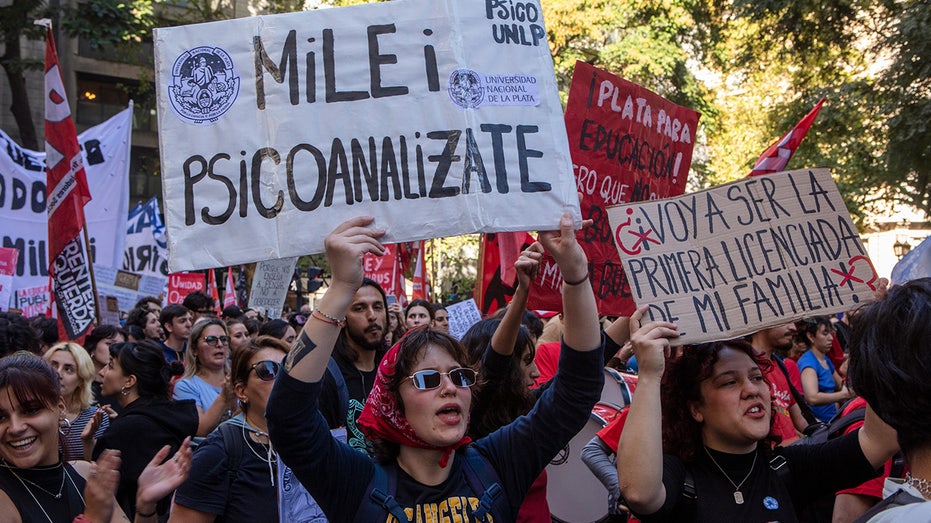“Kudlow” host Larry Kudlow explains how the United States can use the Argentine economic model to control inflation and reduce the deficit in “Making Money.”
Argentine President Javier Milei’s radical economic policies have led to an economic miracle despite pessimistic predictions from economists, academics and political opponents. Milei was the first foreign leader to meet with President-elect Trump after the November election, and he was also cheered by Elon Musk on X and in person at Musk’s headquarters in Texas.
Milei’s star continues to rise.
“What President Milei has done in Argentina economically is nothing short of a miracle,” Joseph Humire, executive director of the Center for a Secure Free Society, told FOX Business.
“In less than a year, he managed to prevent the country from falling into hyperinflation, because when he took office in December 2023, the country was days or weeks away from hyperinflation. So he took immediate action, he focused on reducing spending Then he focused on balancing the budget and then, by mid-2024, he significantly reduced inflation. That was the recipe. initial to be able to stabilize the Argentine economy.
ARGENTINA’S MILEI ELIMINATES DEFICIT, SALUTED AS MODEL FOR MUSK’S ‘DOGE’
Argentine President Javier Milei poses for a photo next to Tesla’s Elon Musk, left, at Gigafactory Texas April 12, 2024, in Austin, Texas. (Presidencia de la Nación Argentina/Handout/Getty Images / Getty Images)
Milei’s administration implemented strict austerity measures, including significant cuts in public spending and subsidies. These measures resulted in a substantial decline in monthly inflation, from 25.5% in December 2023 to 2.7% in October 2024. The Argentine peso strengthened against the black market dollar, indicating increased confidence in the national currency. This assessment reflects the positive reception of Milei’s economic policy by the financial markets.
Martín Menem, president of Argentina’s Chamber of Deputies and vice president of Milei’s political party, La Libertad Avanza, told FOX Business: “Today we have a budget surplus. We have reduced inflation. The economy is expanding. The credit comes back. Real wages are recovering month by month, we are lowering taxes, we are becoming attractive to local and foreign investors, and we are getting closer to our goal every day. rebuild the nation and the prosperity of Argentines.
“To achieve these results that we have never achieved, we are doing what has never been done before. The results show that President Milei’s path is working. We managed to put an end to the decline generated by the budget deficit and we will work every day to deregulate the economy to get back on the path to growth.”
Despite these successes, challenges persist. Austerity measures have led to increased unemployment and poverty, affecting more than half of the population. Additionally, the economy is expected to contract by 3% in 2024, indicating that although stabilization efforts have yielded positive results, structural problems remain. These are some of the reasons why experts and economists still question Milei’s achievements, contrasting them with narratives and policies they see as contradictory.

A woman holds a sign with the words “Milei Psychoanalyze Yourself” as part of a national protest to defend public education against President Milei’s deep budget cuts April 23, 2024, in Buenos Aires, Argentina. (Ricardo Ceppi/Getty Images/Getty Images)
FOX Business contacted two sources who signed a letter signed by 108 economists criticizing Milei’s economic platform released ahead of the country’s elections. Economist Pablo Bortz told FOX Business: “After re-reading the letter we signed, I maintain my position regarding the letter, noting that the government has abandoned the idea of dollarization. »
Another signatory, economist Matías Vernengo, said: “I maintain my position in the letter I signed because I think it is fundamentally correct. Inflation accelerated after Milei’s devaluation. The sustainability of the relative stability of the nominal exchange rate remains to be seen.”
Roberto Cachanosky, an economist who was not part of the letter, told FOX Business: “The most contradictory thing in Milei’s speech and in his policies is that in his speech he always argued that the state was his enemy. in the economy. That prices should be free and the state steals with taxes.
“Also, as a deputy he said that taxes were an obstacle to slavery. The reality is that his pro-market speech ended with a BCRA (Central Bank of Argentina) that not only intervenes in the interest rate and abandons exchange controls, but “We have also maintained exchange controls throughout this year, which constitutes a real confiscation of exporters.”
ARGENTINA’S JAVIER MILEI FLIPS INFLATION ON THE HEAD, EVEN AS POVERTY INCREASES

Presidential candidate Javier Milei de la Libertad Avanza raises a chainsaw next to Buenos Aires provincial gubernatorial candidate Carolina Piparo de la Libertad Avanza during a rally on September 25, 2023 in San Martin, Buenos Aires , Argentina. (Tomas Cuesta/Getty Images / Getty Images)
Milei’s government announced Argentina’s decision first budget surplus in 14 years Friday, giving the so-called libertarian another big victory. Yet criticism of some of his policies remains.
Political analyst Antonella Marty told FOX Business: “Despite promises of reform, the much-vaunted adjustment targeting the so-called ‘political caste’ under President Javier Milei has not materialized. Instead, his administration is filled with underqualified civil servants, their family members, and social media operatives tasked with promoting a moral and ideological agenda, often couched in a deeply religious and messianic tone, focused on a model personalist in which dissent is not tolerated. leaders are quickly forced out of the fold.
“The burden of government adjustments has been disproportionately borne by the private sector, which faces higher taxes and falling real wages. Since Milei took office, the private sector has lost 166,000 jobs, while the public sector has seen 64,000 layoffs. grim scenario for consumption and poverty across the country. For example, consumption of meat – a cultural staple – has fallen by 11%, and 71% of families can afford it. Residents can no longer afford traditional asados. Rising utility costs, including electricity, water and gas, have only added to the pressure. »

Argentine President Javier Milei (Daniel Bockwoldt/photo alliance via Getty Images / Getty Images)
Economist Diego Giacomini recently told FOX Business: “Milei says he will restore competitiveness to the private sector over time by opening the CEPO (allowing the free movement of capital) on the day the rate differential exchange rate and inflation will tend towards zero. Today the exchange rate gap is 3% and according to the latest data we are already there and it has not yet opened the CEPO.
“In the end, economics will not be something distinctive for Javier Milei. As a person who uses and exploits the word freedom, absolutely everything he does in ethical, philosophical, philosophical-political terms, is the antipodes of classical liberalism So, when things end badly on the economic and social levels, it is classical liberalism and freedom which will be responsible.
While some experts suggest that President Milei’s policies have defied some initial economic criticism by achieving significant fiscal and monetary improvements, the current social costs and economic challenges suggest a complex and nuanced outcome.
GET FOX BUSINESS ON THE GO BY CLICKING HERE
Milei, who arrived in Washington this weekend for Trump’s inauguration, met with president-elect in November at the America First Policy Institute gala, where Trump praised the Argentine “for the work you’ve done for Argentina. … Making Argentina great again.”
“I think President Milei has achieved what many thought was the impossible. He has managed to turn the economy at least in a positive direction,” Humire said. “There is a lot to do. He must get rid of exchange controls, attract more investment and increase the purchasing power of the Argentine peso. It is very difficult to come to power with a high approval rating and to then maintain it throughout your first year. Most presidents around the world have experienced a slight decline at the end of the first year.
Reuters contributed to this report.






